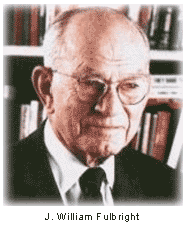Known as one of the most influential senators in American history, J. William Fulbright served as chairman of the Senate Foreign Relations Committee from 1959 through 1974, the group's longest-serving leader. As a member of the House of Representatives, he first received national attention when he authored the Fulbright Resolution in 1942, which encouraged the United States' participation in what later became the United Nations.
 Early years
James William Fulbright was born on April 9, 1905, in Sumner, Missouri. With aspirations to make a positive difference in the world, he first attended the University of Arkansas where he was awarded the B.A. degree in political science, in 1925. Fulbright then attended Oxford University as a Rhodes Scholar and received an M.A. degree upon completion of his studies.
When Fulbright returned to the United States, he studied law at George Washington University in Washington, D.C. The 1930s proved to be Fulbright's starting point in a career of moral suasion and conciliation. He served in the Justice Department and was an instructor at the George Washington University Law School. The year 1936 brought him home to Arkansas, where he was a lecturer in law (1939 to 1941) at the University of Arkansas — quickly becoming president of that institution.
A man with a mission
By 1946, the successful professor and former university president developed the Fulbright Program that funded war reparations and foreign loan repayments to the United States. While he was the chairman of the Senate Foreign Relations Committee, Fulbright wrote a caustic critique, entitled The Arrogance of Power, about the failure Congress made to set limits on the United States' participation in the Vietnam War and the movements that gave rise to it.
Fulbright also warned of the impending results of the passing of the Gulf of Tonkin Resolution in 1964 that led to a further escalation of the Vietnam War. Fulbright left the Senate in 1974, after being defeated in the Democratic primary by then-governor Dale Bumpers.
Former senator J. William Fulbright died of a stroke on February 9, 1995, at the age of 89 at his home in Washington, D.C.
Early years
James William Fulbright was born on April 9, 1905, in Sumner, Missouri. With aspirations to make a positive difference in the world, he first attended the University of Arkansas where he was awarded the B.A. degree in political science, in 1925. Fulbright then attended Oxford University as a Rhodes Scholar and received an M.A. degree upon completion of his studies.
When Fulbright returned to the United States, he studied law at George Washington University in Washington, D.C. The 1930s proved to be Fulbright's starting point in a career of moral suasion and conciliation. He served in the Justice Department and was an instructor at the George Washington University Law School. The year 1936 brought him home to Arkansas, where he was a lecturer in law (1939 to 1941) at the University of Arkansas — quickly becoming president of that institution.
A man with a mission
By 1946, the successful professor and former university president developed the Fulbright Program that funded war reparations and foreign loan repayments to the United States. While he was the chairman of the Senate Foreign Relations Committee, Fulbright wrote a caustic critique, entitled The Arrogance of Power, about the failure Congress made to set limits on the United States' participation in the Vietnam War and the movements that gave rise to it.
Fulbright also warned of the impending results of the passing of the Gulf of Tonkin Resolution in 1964 that led to a further escalation of the Vietnam War. Fulbright left the Senate in 1974, after being defeated in the Democratic primary by then-governor Dale Bumpers.
Former senator J. William Fulbright died of a stroke on February 9, 1995, at the age of 89 at his home in Washington, D.C.
Throughout our history two strands have coexisted uneasily; a dominant strand of democratic humanism and a lesser, but durable strand of intolerant Puritanism. There has been a tendency through the years for reason and moderation to prevail as long as things are going tolerably well or as long as our problems seem clear and finite and manageable. But... when some event or leader of opinion has aroused the people to a state of high emotion, our puritan spirit has tended to break through, leading us to look at the world through the distorting prism of a harsh and angry moralism. - The Arrogance of Power, J. William Fulbright, 1966.